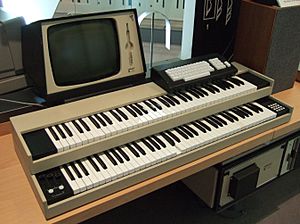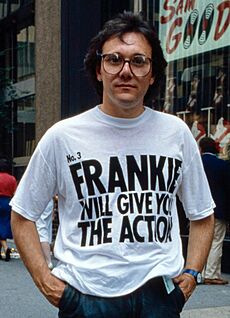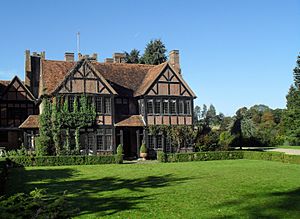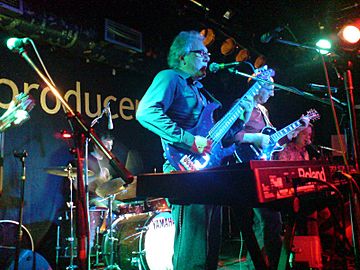Trevor Horn facts for kids
Quick facts for kids Trevor Horn |
|
|---|---|
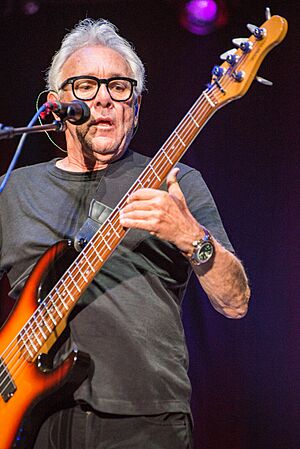
Horn in 2022
|
|
| Background information | |
| Birth name | Trevor Charles Horn |
| Born | 15 July 1949 Hetton-le-Hole, County Durham, England |
| Genres | |
| Occupation(s) |
|
| Instruments |
|
| Years active | 1963–present |
| Labels | ZTT |
Trevor Charles Horn (born on July 15, 1949) is an English record producer and musician. He became super important in pop and electronic music during the 1980s. Some people even called him "the man who invented the eighties" because of his big influence!
Trevor Horn started playing the bass guitar when he was young. He taught himself to read music by looking at it. In the 1970s, he worked as a musician for recording sessions. He also built his own music studio and created songs for different artists. Horn became famous in 1979 as a member of the band the Buggles. They had a huge hit song called "Video Killed the Radio Star". After that, he was asked to join the progressive rock band Yes as their lead singer.
In 1981, Horn decided to focus on being a full-time music producer. He worked on many successful songs and albums for artists like Yes, Dollar, ABC, Malcolm McLaren, Grace Jones, and Frankie Goes to Hollywood. In 1983, Horn and his wife, Jill Sinclair, bought a music studio in London called Sarm West Studios. They also started their own record label, ZTT Records, with a journalist named Paul Morley. Horn also helped create the electronic music group Art of Noise. In the years that followed, Horn produced hits for artists like Seal, t.A.T.u., and LeAnn Rimes. He also produced the 2003 album Dear Catastrophe Waitress for Belle and Sebastian. Since 2006, he has performed with a supergroup called Producers, which is now known as the Trevor Horn Band.
Trevor Horn has won many awards. These include Brit Awards for Best British Producer in 1983, 1985, and 1992. He also won a Grammy Award in 1995 for producing Seal's song "Kiss from a Rose". In 2010, he received an Ivor Novello Award for his amazing contributions to British Music.
Contents
- Early Life and Musical Beginnings
- Career Highlights and Music Production
- 1971–1979: Starting Out in Music
- 1978–1980: The Buggles and "Video Killed the Radio Star"
- 1980: Joining Yes
- 1980–1982: Producing for Dollar, ABC, and Malcolm McLaren
- 1983–1989: ZTT Records, Frankie Goes to Hollywood, and Grace Jones
- 1990s: Working with Seal and More
- 2000s: New Hits and Collaborations
- 2010s–Present: Continued Music Work
- Influence on Music
- Personal Life
- Discography
- Awards and Recognition
- See also
Early Life and Musical Beginnings
Trevor Charles Horn was born on July 15, 1949, in Hetton-le-Hole, England. He grew up in Durham City. He was the second of four children. His father was an engineer at a nearby dairy and also a professional musician who played the double bass. Trevor went to Johnston Grammar School in Durham.
When he was about eight years old, Trevor started playing the double bass. His father taught him the basics, including how to play musical chords. He then taught himself to play the bass guitar. He became good at reading music by practicing with guide books on his father's guitar. When he was a teenager, Trevor sometimes played the double bass for his father's band when his dad was running late. At school, he learned to play the recorder easily because he already knew a lot about music. He also played in the local youth orchestra. Later, he became interested in rock bands like the Beatles and the Rolling Stones. At 14, Trevor played electric guitar in his first band, the Outer Limits, which played cover songs by the Kinks.
After school, Horn had different jobs. He even did a Bob Dylan imitation act a couple of nights a week. At 17, he decided he wanted to be a musician full-time. His parents wanted him to be an accountant because he was good at math, but he didn't pass the exams. After being fired from a job at a plastic bag factory, he decided he would only work in music. The very next day, he got an offer to play bass in a local band at a dance hall, playing popular songs for £24 a week. He also had his own songs played on BBC Radio Leicester.
Career Highlights and Music Production
1971–1979: Starting Out in Music
When he was 21, Trevor Horn moved to London. He played in a band that re-recorded popular songs for BBC radio because of rules about how much music could be played. He also spent a year with Ray McVay's big band, performing at dancing championships and on TV shows. Horn joined other groups and even spent time in Denmark, where he ran out of money and his mother had to send him money to come home. He also worked as a musician for rock groups and for short advertising songs called jingles. At 24, Horn started working in Leicester. He played bass at a nightclub every night and helped build a recording studio. He produced songs for local artists, including one for the Leicester City F.C. football team.
By 1976, Horn was back in London. He played bass in a band called Nick North and Northern Lights, which also included keyboard player Geoff Downes and singer Tina Charles. Horn then formed a jazz fusion band called Tracks. He also worked as a session musician and learned a lot from Tina Charles's producer, Biddu.
In the mid-1970s, Horn worked for a music publisher in London, making demo songs. From 1977 to 1979, he worked on many songs as a songwriter, producer, or orchestra director, but he didn't make much money. He produced songs for artists like Tony Cole and Fallen Angel. He also wrote "Boot Boot Woman" for the band Boogatti. In 1978, Horn wrote, sang, and produced "Caribbean Air Control" under the name Big A. In 1979, he worked on a "sci-fi disco project" album called Star to Star for the band Chromium. This album featured Horn and Downes as songwriters and producers, and Anne Dudley, who would later join Horn in Art of Noise, on keyboards. Horn got his first production hit when "Monkey Chop" by Dan-I reached No. 30 on the UK Singles Chart in 1979.
1978–1980: The Buggles and "Video Killed the Radio Star"
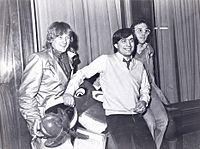
In 1978, Trevor Horn and Geoff Downes formed the new wave band the Buggles. They got a record deal with Island Records and spent most of 1979 recording their first album, The Age of Plastic (1980). Horn was listed as co-producer, lead singer, guitarist, and bassist on the album.
The Buggles' first song, "Video Killed the Radio Star", came out in September 1979. It quickly became No. 1 in the UK, making Horn famous at 30 years old. In August 1981, "Video Killed the Radio Star" was the very first music video ever shown on MTV.
1980: Joining Yes
The Buggles shared a manager with the progressive rock band Yes. When Yes's singer and keyboard player left, Horn and Downes were invited to join the band. Yes recorded an album called Drama (1980), with Horn singing and playing bass. However, during the tour, some fans didn't like Horn as the new singer. Yes decided to let Horn go after the tour.
1980–1982: Producing for Dollar, ABC, and Malcolm McLaren
In 1980, Horn married music executive Jill Sinclair, who became his manager. She told him that he would be more successful as a producer than as an artist. Horn started gathering studio equipment, including a Roland TR-808 drum machine and a Fairlight CMI, which was an early digital synthesizer. The Fairlight cost £18,000 and was one of only four in the UK at the time. It was one of the first machines that allowed musicians to play back recorded sounds, like sound effects, at different pitches. Horn understood how this new technology worked, and he became a key person in using "samples" (short pieces of recorded sound) in pop music. His knowledge of electronic equipment greatly influenced how pop music developed in the 1980s.
In 1981, Horn finished a second Buggles album, Adventures in Modern Recording, mostly by himself after Downes left to form the band Asia. Horn then produced a series of hit songs for the pop duo Dollar. He wrote songs like "Mirror Mirror" and "Give Me Back My Heart". All four of these songs became top 20 hits in the UK. Even though Dollar was not a very cool band, Horn saw a chance to mix electronic music with their style. Music journalist Alexis Petridis said that The Dollar Album showed what 80s pop music would sound like, with "booming drums, high-drama synthesizers and sampled voices."
Horn's success with Dollar led to other artists wanting to work with him. Next, he produced The Lexicon of Love for the band ABC. He also worked with Anne Dudley on the string arrangements for the album. ABC's first album became one of the best-selling albums of 1982. Horn won the 1983 Brit Award for British Producer of the Year because of his work on this album.
In 1982, Horn and Sinclair started a music publishing company called Perfect Songs. In 1983, Horn produced Duck Rock for Malcolm McLaren, who used to manage the Sex Pistols. This album included the song "Buffalo Gals", which is known as the first British hip hop song.
1983–1989: ZTT Records, Frankie Goes to Hollywood, and Grace Jones
In 1983, Horn and Jill Sinclair bought Basing Street Studios in London and renamed it Sarm West Studios. With journalist Paul Morley, they also started a record label called ZTT Records. The first band they signed was Frankie Goes to Hollywood. Horn produced their very successful first album, Welcome to the Pleasuredome. He completely changed their first song, "Relax". This song was described as a new kind of dance-synth-pop that sounded fresh and exciting for the 80s. "Relax" became No. 1 on the UK Singles Chart. At this time, Horn was also working with Foreigner in the US. However, he left that project to focus on Frankie Goes to Hollywood's next song, "Two Tribes", and their album, which had two more hit songs.
Horn worked with Yes again to produce their 1983 album 90125. He convinced them to record "Owner of a Lonely Heart", even though they thought it was "too poppy". It became their only No. 1 song in the USA. In 1983, Horn also helped form the band Art of Noise. He co-wrote several hit songs for them, including "Close (To the Edit)" and "Beat Box". The song "Slave to the Rhythm" was originally meant for Frankie Goes to Hollywood, but it was given to Grace Jones instead. Horn and his studio team turned it into six different songs to create Jones's 1985 album Slave to the Rhythm. This album featured Pink Floyd guitarist David Gilmour.
In 1984, Bob Geldof asked Horn to produce the charity song "Do They Know It's Christmas?" to raise money for people affected by a famine in Ethiopia. Horn said he would need at least six weeks, which was too long to release it by Christmas. However, he let the team use his studios, Sarm West Studios, for free for 24 hours on November 25. Horn later remixed the song for its 1985 re-release and again in 2024 for its fortieth anniversary.
In the late 1980s, Horn moved to Bel Air, Los Angeles, where he set up another recording studio called Sarm West Coast LA. He produced another Yes album, Big Generator (1987), and co-produced the Simple Minds album Street Fighting Years (1989).
1990s: Working with Seal and More
In 1990, Horn produced the first album by the English singer Seal. This started a long partnership because Horn liked Seal's voice and how they worked together on songs. Seal's album reached No. 1 in the UK, and the first song, "Crazy", went to No. 2. This album was a big change in how Horn produced music. He started using computers instead of older studio equipment. He recorded songs on Seal using computer software. Horn was happy with the results and switched to using Apple Macintosh computers for his work. At this point in his career, Horn was less interested in making long dance mixes of songs, so he brought in other remixers to do them while he focused on full albums.
He also produced half of the songs on Marc Almond's 1991 album Tenement Symphony, including three hit songs. In the 1990s, Horn wrote and produced songs for artists like Inga Humpe and Betsy Cook. He also co-wrote two songs for Terry Reid's 1991 album The Driver and wrote "The Shape of Things to Come" for Cher's 1995 album It's a Man's World.
Horn co-produced Mike Oldfield's 1992 album Tubular Bells II. Oldfield was a fan of "Video Killed The Radio Star" and said that Horn was like a judge, nodding or shaking his head at his ideas, which helped him choose the best ones.
Horn worked with composer Hans Zimmer to produce the music for the 1992 film Toys. Horn also co-wrote "Everybody Up", the theme song for the comedy series The Glam Metal Detectives in 1995.
In the mid-1990s, Horn and Sinclair bought Hook End Manor in Oxfordshire and renamed its recording studio Sarm Hook End. In 1995, Horn produced "The Carpet Crawlers 1999", a new version of a song by Genesis that featured vocals from their former singers, Peter Gabriel and Phil Collins. In 1996, Horn produced the very popular album Wildest Dreams by Tina Turner.
2000s: New Hits and Collaborations
In the 2000s, Horn was hired to create English versions of songs by the Russian pop duo t.A.T.u.. He wrote new lyrics for "All the Things She Said" and "Not Gonna Get Us" and taught t.A.T.u. how to sing them in English. He also re-recorded the music for the songs. "All the Things She Said" became No. 1 on the UK Singles Chart.
For the 2000 film Coyote Ugly, Horn produced "Can't Fight the Moonlight" by American singer LeAnn Rimes. This song sold over two million copies worldwide and reached No. 1 in the UK and Australia. Horn also co-wrote "Pass the Flame" (the official torch relay song for the 2004 Olympics in Athens) and the title song from Lisa Stansfield's 2004 album The Moment.
Horn co-wrote "Sound the Bugle", sung by Bryan Adams for the Spirit: Stallion of the Cimarron movie soundtrack. He also produced three songs for Eros Ramazzotti's 2001 album Stilelibero.
Horn produced the 2003 Belle and Sebastian album Dear Catastrophe Waitress. This was a surprising choice because Horn was known for using electronic equipment, while Belle and Sebastian were known for their more traditional indie music.
On November 11, 2004, a charity concert for the Prince's Trust was held to celebrate Horn's 25 years as a record producer. Many artists he produced performed at the concert. It was later released on DVD and as a compilation album called Produced by Trevor Horn (2004).
In 2006, Horn helped form a supergroup called the Producers. They performed their first show in November 2006. They still perform today under the name the Trevor Horn Band.
Horn produced the ninth album by the synth-pop duo the Pet Shop Boys, Fundamental, which came out in May 2006 and reached No. 5 in the UK. He also produced an album version of a Pet Shop Boys concert called Concrete. Horn produced Captain's first album, This is Hazelville, in late 2006. He also worked with the British band Delays on their song "Valentine" and with artists like John Legend and David Jordan.
In 2007, Horn sold his Sarm Hook End studio and moved to Primrose Hill, London.
For the 2008 movie Wanted, Horn produced Danny Elfman's singing for the closing credits song "The Little Things". In 2009, Horn produced Reality Killed the Video Star, the eighth album by Robbie Williams. The album title refers to the Buggles song and how Horn and Williams both disliked reality TV and music competition shows. It reached No. 2 on the UK Album Chart.
2010s–Present: Continued Music Work
Horn was the executive producer for Jeff Beck's 2010 album Emotion & Commotion. He worked with Yes again, producing their new album from October 2010. That album, Fly From Here (2011), brought Horn back together with his former bandmate Geoff Downes. The album's title comes from a song Horn and Downes wrote that Yes performed in 1980.
In 2017, Horn wrote the music for the anime show The Reflection, which was co-produced by Stan Lee. The soundtrack was released as Horn's first album under his own name. Horn remixed the 2011 album Fly From Here with Yes, adding new singing and editing parts. This new version is called Fly from Here – Return Trip and was released in March 2018. He has also been working on musicals, including one called "The Robot Sings".
In November 2018, Horn performed a special concert in London. Horn's new album, Trevor Horn Reimagines the Eighties, was released on January 25, 2019. It included a song called "Everybody Wants to Rule the World" with Robbie Williams singing. Other guest singers on the album included Rumer, All Saints, Simple Minds, and Gabrielle Aplin. In late 2017, Horn's Sarm West Coast studio in Bel Air, Los Angeles, was destroyed in a fire. Horn was not there at the time.
Horn toured as the bass player in Dire Straits Legacy from 2018 to 2020. In late 2022, he published a book about his life called Adventures in Modern Recording: From ABC to ZTT. He joined Seal's 2023 tour, playing bass in Seal's band and performing as the Buggles as an opening act. In December 2023, Horn released Echoes: Ancient & Modern, another album of cover songs with guest singers.
Influence on Music
Many musicians and producers, including Gary Barlow, DJ Shadow, and Nigel Godrich, say that Trevor Horn has influenced their work.
Personal Life
Trevor Horn met Jill Sinclair, a former math teacher, in 1977. They got married in 1980 and became business partners. They had four children: two sons, Aaron and Will, and two daughters, Gabriella and Alexandra. Aaron is also a musician and producer. He was in the band Sam and the Womp. As of 2016, Horn has three grandsons. He is not Jewish, but he has attended synagogue with his children, who were raised in his wife's faith. In a 2019 interview, he said he "believes in [Judaism] more than anything else."
On June 25, 2006, Jill Sinclair was accidentally hit by a pellet from an air gun. This caused serious brain damage. She sadly passed away from cancer on March 22, 2014, at the age of 61.
Discography
Solo studio albums
- Made in Basing Street (2012, with Producers)
- The Reflection: Wave One – Original Sound Track (2017)
- Reimagines the Eighties (2019)
- Echoes: Ancient & Modern (2023)
Awards and Recognition
- BRIT Award 1983 – Best British Producer
- BRIT Award 1985 – Best British Producer
- BRIT Award 1992 – Best British Producer
- Grammy Award 1995 – Record of the Year (as producer of "Kiss from a Rose")
- Horn was given the title Commander of the Order of the British Empire (CBE) in 2011 for his services to the music industry.
- He received an honorary degree of Doctor of Music in 2012 from Southampton Solent University in England.
See also
 In Spanish: Trevor Horn para niños
In Spanish: Trevor Horn para niños
 | Tommie Smith |
 | Simone Manuel |
 | Shani Davis |
 | Simone Biles |
 | Alice Coachman |


